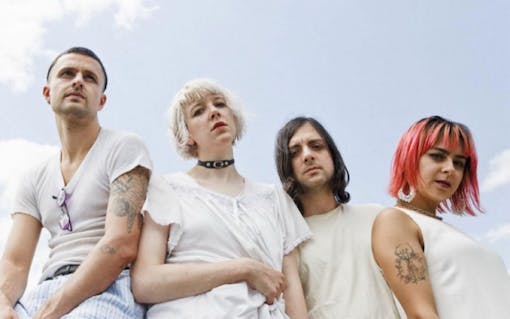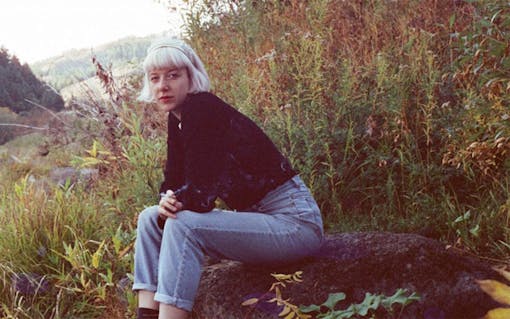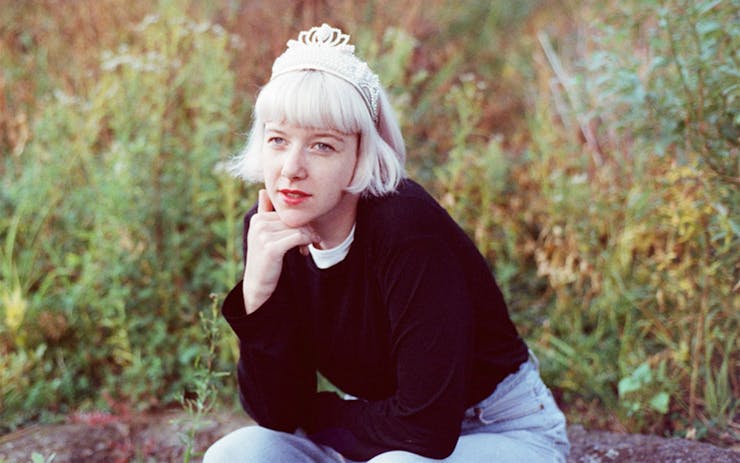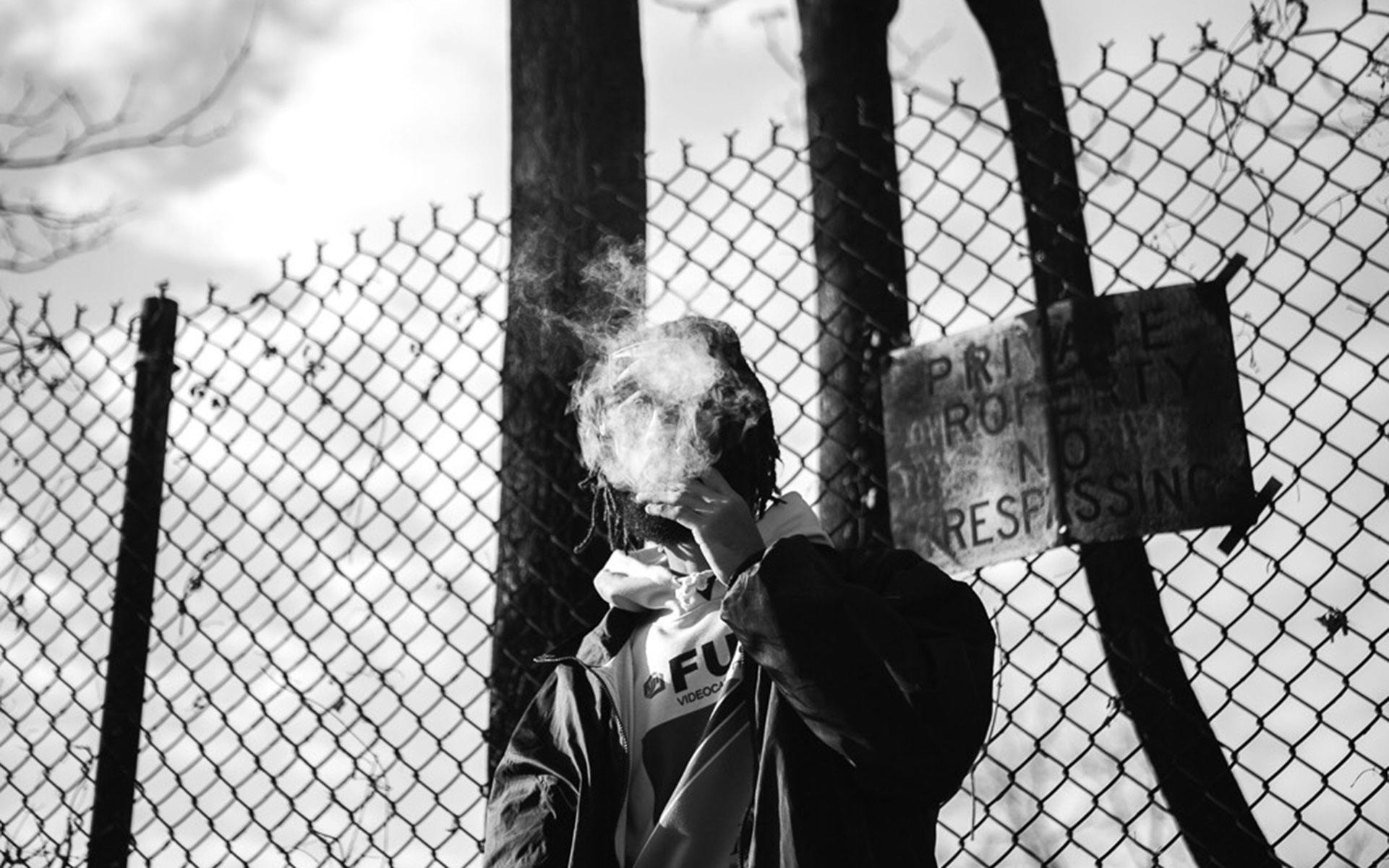It was 2015 when Toronto quartet Dilly Dally saw the release of their youth-spirited, ear-piercing debut album, Sore. The punk outfit made up of vocalist/guitarist Katie Monks, guitarist Liz Bell, bassist Jimmy Tony, and drummer Benjamin Reinhartz, harnessed a sound energized by apathy and fury, spearheaded by Monks’ signature wallowing howl, and laced together with a love for 90s grunge, and an eye-catching album cover bearing a freshly bleeding tongue carrying an arrangement of small stones.
Pair your favorite music with cannabis—find dispensaries nearby.
Monks’ raspy voice counts off the start of Sore with “Desire,” a track that oozes adolescent lust and sexual fantasy, and the album varies in carefree breath and feminist rage from there. “Snake Head” juxtaposes the image of Medusa with a woman on her period (“Excuse me, let me get my backpack, These painkillers are no fun”), “Ballin Chain” goes back and forth with its instrumental tension and release, as Monks whispers “I’ll miss you, I’ll miss you“ just before letting out a roaring vocal shriek.
“Purple Rage” sees an empowered Katie Monks leaving her past life to start anew with Dilly Dally, just over thumping snares and powerful, grimy guitars. At the time of its release—and even three years later—Sore is the type of debut album many bands would die to see blossom, garnering critical attention while enabling tours around the world.
But it many ways, Dilly Dally’s debut album did, in fact, kill them … Kind of.
From Answered Dreams to Daunting Reality

(Courtesy of Kate Killet)
Formed by Monks and Bell in high school over a mutual bond for music, Dilly Dally set to take over the world with their unique sound—a dream Monks and Bell believed in chasing so much, they tattooed their band name onto their bodies parlour before having much of a songwriting stint.
“That was Dilly Dally’s main issue in my eyes: we had become too reliant on the project itself, that each band member didn’t feel they had freedom.”
Sore’s success catapulted the band into the limelight in a way no member could’ve prepared for—despite Monks and Bell’s eagerness for fame by way of music. Dilly Dally went on to support the album by tour, playing countless shows while trying to catch up to the momentum of being an artist. But as a unit, Dilly Dally would soon find a new lifestyle that carried fatigue and irritability.
“We were just exhausted physically and emotionally,” Monks told The Fader. “You’re busy and stretched so thin, and you don’t have alone time or even one-on-one time with each other, to be like, ‘Hey, how are you doing?’ It was always four of us all the time. Every band struggles with that—being in the midst of this pressure cooker tour and anything you’re dealing with internally ends up coming out in these sinister ways. I think it brought out the worst in all of us.”
The group was exhausted while supporting Sore, and being on the road didn’t help. They felt the bond they had shared prior to takeoff dissolved, and with each member attempting to maintain their personal lives, they had no emotional support from each other.
“You have to be very careful to avoid codependency,” Monks further elaborated with Leafly over email. “That was Dilly Dally’s main issue in my eyes: we had become too reliant on the project itself, that each band member didn’t feel they had freedom.”
After finishing up a tour alongside Grouplove, and leading directly into the 2016 Presidential Election, the band came home to retreat in their own ways; Dilly Dally suffered from a post-tour depression. Monks went home and continued writing music, solo, in hopes of releasing it by herself. “I was definitely like…well, fuck, I guess I’ll just write the whole album by myself” she revealed. “Instead, I just ended up recording hundreds of hours of unedited song ideas by myself in my room over the course of seven months. I treated it like a full-time job, just writing. Looking back, it seemed so fun—and it was, at times! But it was also very lonely.”
Guitars, Retreat, and Healing With Music

(Courtesy of Kate Killet)
Monks looked inward and discovered a self-care routine, which included going offline with social media, surrounding herself in the color white (furnishing, bedsheets, her hair color) as a sort of angelic symbolism, and trading in her guitar for an all-white Flying V.
Shop highly rated dispensaries near you
Showing you dispensaries near“I also know nothing about guitars,” Monks says about her guitar choice. “I find guitar culture to be very strange—it always intimidated me actually. And felt like I wasn’t ‘invited to the club.’ Guys always told me what was a cool guitar and a cool tone and what was not. It’s not cause these guys were sexist or shitty people or anything like that—they were my friends! But I just wanted to prove to everyone that none of that shit matters. The only reason anyone ever says that a Fender Jazzmaster is cool is because Sonic Youth made it cool. And I guess I just had the guts to step up on stage with this white Flying V to convince everyone that it was a beautiful instrument too.”
“The only reason anyone ever says that a Fender Jazzmaster is cool is because Sonic Youth made it cool.”
Out of the ashes of Sore and by way of self-care birthed Heaven, Dilly Dally’s sophomore album in which Monks describes as “something that could help heal old wounds and rejuvenates us while we’re on the road.”
Heaven is the product of Monks’ writing organically, finished with the rest of the band she had no longer felt so close to. Our first glimpse of the phoenix that Dilly Dally came to be was “I Feel Free,” a visceral song that serves as a message for her fellow friends and band members. The music video shows Monks sporting her new Flying V and digging up the bodies of her bandmates to play once again.
Heaven sits at nine tracks and was recorded in L.A. and produced by Rob Schnapf, whose production credits include The Vines, Beck, Dr. Dog, and Monks’ brother’s band, Tokyo Police Club. The album is a collection of songs used to ward off depression and display Dilly Dally’s most potent work to date.
“Sober Motel,” a song written about Dilly Dally’s bassist, Jimmy Tony, and a celebration of his sobriety, sounds like a welcome leftover track from Sore, ironically channeling carefree stoner rock vibes. “Bad Biology” details a queer love and demolishes gender, as Monks describes being bad at being a boy and bad at being a girl.
Dilly Dally truly embraces their more apathetic, sludgy sound with the song “Marijuana,” which features a type of macho rock feeling that would make Josh Homme blush. Monks sings of the self-care that helped her through her darker past:
Marijuana keeps me still, Takes all the anxiety from seeping in
Hearing voices, Sound so free
It’s like these angels got wrecked and torn apart, Inside of me.
“It’s funny, the song ‘Marijuana’ isn’t exactly about weed,” Monks details. “It’s mainly about this DIY spirituality I turned to when I was really depressed. Music is the biggest part of that ‘spirituality,’ but also mediation, nature, poetry, sex, tarot and weed are also things that have contributed. I’m sure a lot of people can relate to this, but I didn’t grow up in a spiritual house hold at all. I just kinda had to figure out my own ‘healing’ practices for feeling fucked up. And I’m really grateful for that – because otherwise Dilly Dally’s dark and stoner-y version of Heaven wouldn’t exist.”
Luckily, Heaven does exist, and it’s through the worst experiences that Dilly Dally found it.
“Weed is one useful tool I have in the closet that allows me be in the moment.”
“Self-care looks different for everyone,” Monks said. “But for myself, in order to stand on that stage every night and feel like I have something to say, I have to really dig inside myself and find some wisdom in there. It’s hard, because to find those inner-truths, you gotta work your way around (or through) a lot of negative thoughts: daily stress, self-doubt, fear of being judged, sadness about the world, pain from the past … the list goes on and on.”
“Weed is one useful tool I have in the closet that allows me be in the moment and see past all that stuff,” she continued. “Just look straight ahead at the song I’m trying write as its own entity. There’s like, no ego anymore. Now having said that – if I’m writing stoned, I rarely can finish a song. But initiating a new idea, when I’m in a state of mind that’s like, ‘the possibilities are endless!’—it helps the messages stay pure and untethered. After that, (in my sobriety later) it’s all about trying to like bring that spaced out vision into a reality.”






